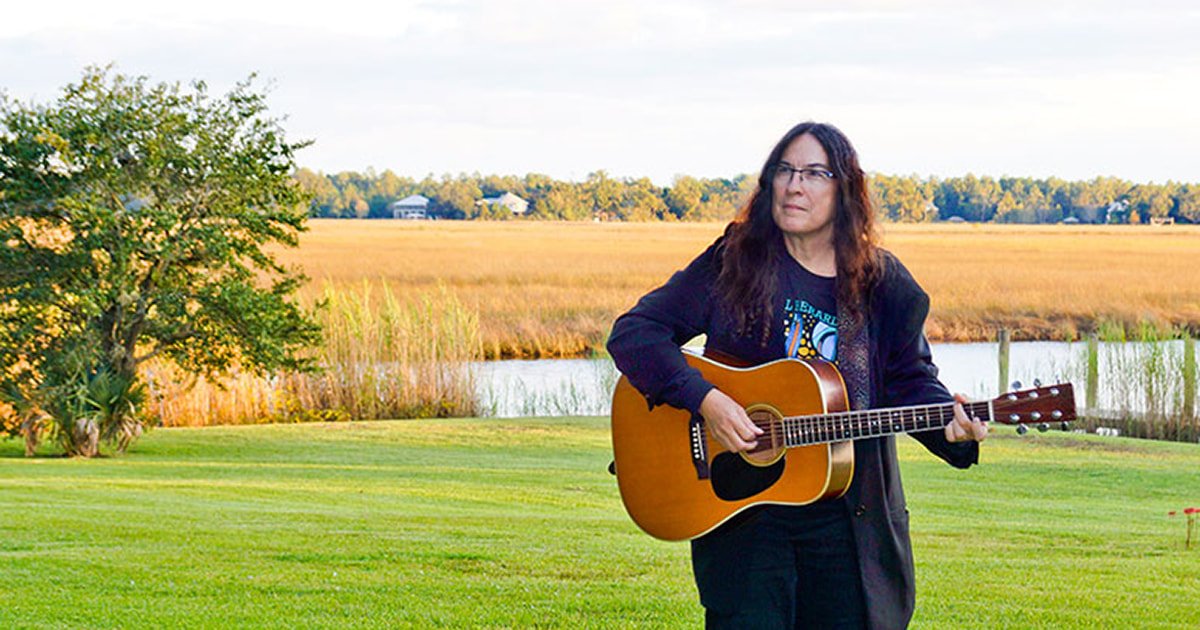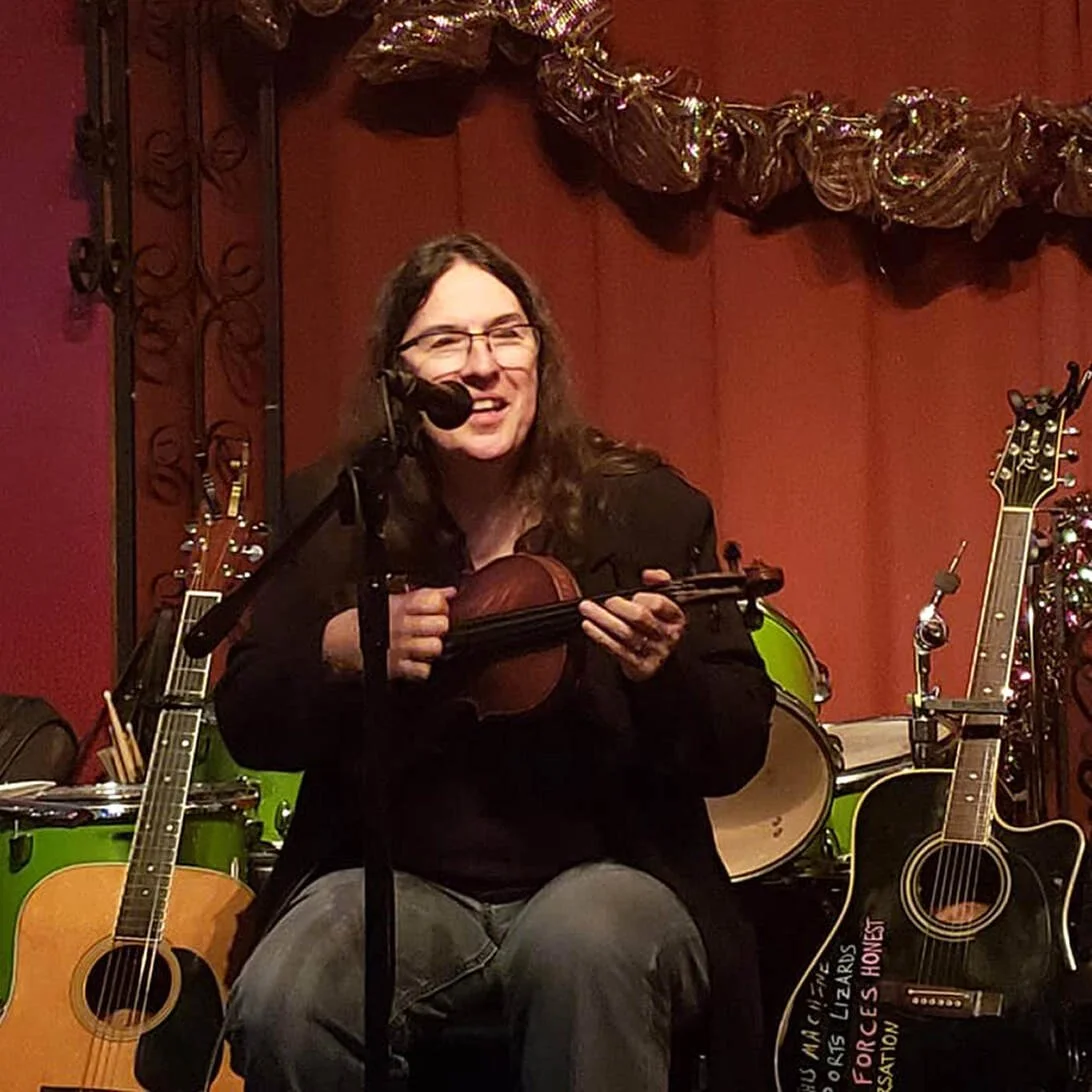Something About Gina Forsyth
Gina Forsyth on the bayou. photo by Ellis Anderson
November 2019With a wicked sense of humor, stellar instrumental skills and a voice that stirs listeners, this singer-songwriter hits all the heart notes.
- by Rheta Grimsley Johnson
Something about Gina Forsyth - tall and lanky, clothed in black, guitar on her back, singing for her supper - makes you think of an ole-timey circuit rider, one who traveled between country churches and free meals to rail about brimstone and hell.
Kris Kristofferson’s “Pilgrim” comes to mind. True, Gina Forsyth is not wasted on the sidewalk in her jacket and her jeans. But she’s definitely a poet, a prophet and maybe even a little bit preacher.
For Gina, it is not about making money, that’s for sure. It took her 10 years to pay off student loans. This is a calling.
In the tradition of Woody Guthrie and with a wicked John Prine-ish sense of humor, Gina is one of that endangered breed that roams the earth using music as a weapon of protest.
Our Christmas was made in China, human rights issues and all. From my brand new socks to my old gym shoes, to the decorations on the wall…. They don’t have Christmas in China, not like in the U.S.A. There they work for chicken feed, making things we think we need….
I first saw her perform as a country fiddler, not a folk singer. I heard Gina play seven times before I spoke a single word to her, unless you count one quick howdy in the ladies’ room in the old Liberty Theater in Eunice, La. For seven years straight I went to the Hank Williams tribute held at the Liberty. And that’s the only way I knew her.
The Liberty tribute is mostly a male musician showcase, as you might expect, with band members wearing bolo ties and high-waisted black pants and their best Hank hats and slumped postures. Gina was the only female in the band. The mere sight of her, statuesque with dark Rita Coolidge hair, was impressive before she ever touched bow to catgut. She was regal.
It would have been enough, really, for any musician to play fiddle half as well as the celebrated Jerry Rivers did in Hank’s famous Drifting Cowboys band. For Gina, no problem.
But there was much more about Gina to discover. One summer’s night at a cozy New Orleans music club called Buffa’s on the corner of Esplanade and Burgundy, Gina Forsyth – there was no mistaking her – stalked in and started picking and singing. What’s more, she was performing her own songs, folk and Cajun and country. I realized then that this woman had more dimensions than a pop-up card.
photo by Ellis Anderson
Her voice was distinctive, a strong alto in an unidentifiable accent that was not New Orleans, or typical Mobile where she’d grown up, or Florida where she’d been born. It was an amalgam of Southern and something else - maybe a brush stroke from her mercurial Italian-American mother, or from the Cajun culture in which she immersed herself as a young adult after being trained in classical and jazz violin at Loyola.
But it was her writing, her lyrics, which knocked me to my knees. She somehow was making her fans think and laugh at the same time, poking fun at the South, yet professing a love of it as well. She was making a rhapsodic pitch for a flawed romance with a region.
In the sweet and sunny South where I was born…. Where we love our musicians, and our fascist politicians, in the sweet and sunny South where I was born…. Moss on the magnolia, and it’s grits and not granola, and they know it from Shine-Ola, in the sweet and sunny South where I was born.. .. Where Washington and Lee can’t get married legally. … Oh, I love it and I hate it, every now and then berate it….
“Sweet and Sunny South” is her signature song, and the lyrics change with the headlines. On the night I first heard it, she worked in the BP oil spill and Chick-fil-A controversies. And the last time, “Washington and Lee can get married – finally!”
Evolution.
After that memorable New Orleans performance, I wrote a column for King Features Syndicate. We became friends. That’s my disclosure. I’m proud to call her friend.
So it is that ever so often, Gina calls on her way from Thibodaux to Timbuktu, Nova Scotia to New Orleans, and asks if it’s okay if she flops on a sofa. When you are on the road 100 days or so a year, sofa-flopping is part of the equation. So is the 2003 Saturn Ion, which, she says, “is likely the last car I’ll ever own with a cassette player.”
In her mid-fifties, Gina admits, “Some may say, I’m a little old to continue being on the road. But I’m finding I really enjoy it.”
She plays regular gigs in New Orleans, where she lived for 30 years. She recently moved to tiny Breaux Bridge in the heart of Cajun country, relocating for love.
In 2016, in a Lafayette Episcopal church and Cajun wedding, Gina married a curly-haired French teacher, a woman named Jan. It was “six months after the Supreme Court decision came down.”
photo by Ellis Anderson
In Breaux Bridge, Gina finds herself playing “a lot more Cajun fiddle gigs.” One of her albums, “Promised Land,” recently was a folk album Grammy finalist and its title song made it to Number One on the Folk DJ List. But finding an audience for her original music requires commutes to New Orleans, Baton Rouge or elsewhere.
Her first musical journey began as a child, when she sang songs she made up herself and heard country, classical and church music from both black and white congregations. Her father was an oxymoronic mix of Baptist and liberal – not to mention, before health problems – a professional tap dancer. He loved music, bringing home the Pete Seeger LP that first introduced Gina to folk music long after it was stylish.
“He was a believer and a Christian, but also a strong lefty,” Gina says. “I think at one time, he was a socialist, after Norman Thomas and Upton Sinclair, but when FDR took office he became a New Deal Democrat. He also supported Civil Rights and integrating the public schools, including the ones I attended in Mobile County.”
Gina picked up his politics -- and the violin and guitar by age 11. At 15, she was playing in Mobile County’s Student Symphony Orchestra, and after high school was awarded an orchestra scholarship to study jazz and classical violin. So trained, she might have done anything with her music. But she was fascinated with Cajun music and culture and, soon enough, fluent in the unwritten and archaic French language.
Gina at a Buffa's Song Circle, photo by Natasha Sanchez
That began a decades-long association with Cajun bands. For 20 years she has played with legendary accordionist Bruce Daigrepont and toured with the Mid-City Aces. Her performances nearly always include a few songs sung in French.
Gina’s passion for folk music continued, too, and she is part of a trio called the Malvinas -- named after the late Malvina Reynolds (“Little Boxes,” “Turn Around”) -- which toured the U.S. and Canada and cut three acclaimed CDs.
When asked what musicians influenced her, the list is as long as she is tall, everyone from Hank to Bob Dylan. If you can do it all, you do. From playing classic fiddle covers to crooning a song about working without benefit of union wages on Mardi Gras day, Gina will perform for six or 600. Sometimes, just for the novelty, she holds the fiddle behind her head to play.
About her songwriting, Gina says: “I get inspired to write a song whenever I feel it’s something that has to be said, something that I cannot not say.”
New Orleans singer and songwriter Lilli Lewis praises Gina for writing a song “that feels like it’s always been there.” Lilli covers one such tune called “Sparrows” on her own album.
“I remember being so taken with ‘Sparrows’ that I thought it was a song she discovered in the hills somewhere, not one that she’d penned herself….,” Lilli raves.
“She is literally the only musician who plays in New Orleans who I’ll bend over backwards to go out and see. She stops time for me, and I feel like when I surrender myself to her view for the hour or so she’s playing I’ll leave a better human, more tender and strong than when I entered. How many folks can you say that about?”
Wish I could fly like the smallest of sparrows, High o’er the earth, and far from the ground. And all I would feel then, would be the wings beating, To gravity’s ceiling, I’d never be bound.
Upcoming Live Performances:
11/22, 5:30pm - 8:30pm
New Orleans Museum of Art
Friday Nights at NOMA
11/30, 10pm
Neutral Ground Coffee House
5110 Danneell Street, NOLA
Find out more about Gina on her website. Click here to listen to sample tracks and purchase Gina's music from Louisiana Music Factory.
Features like this are made possible by reader support–We're grateful for every donation –Join our Readers’ Circle with gifts as small as $5





